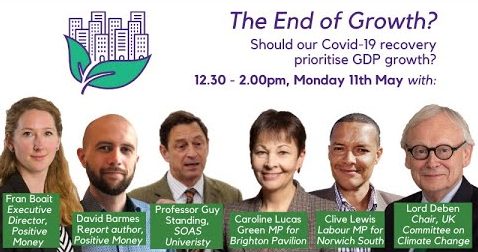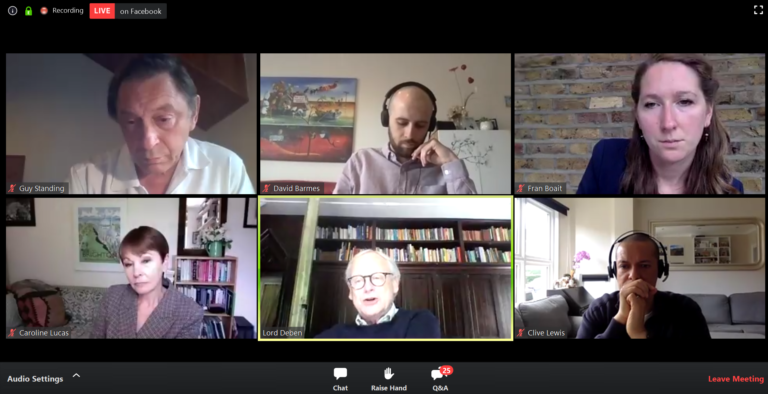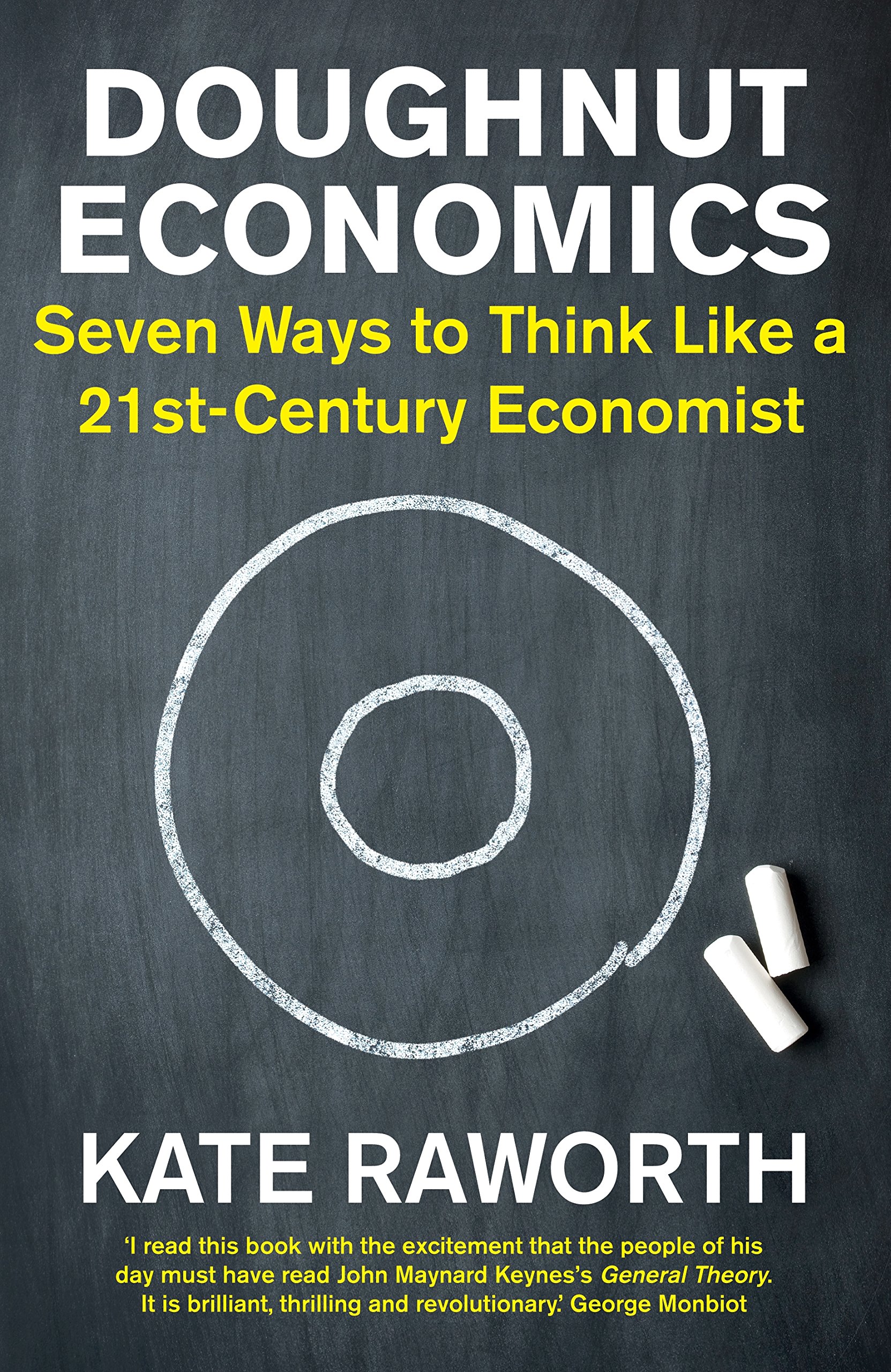A post-growth economy: thinking the unthinkable
Posted on 27 May 2020 Categories: Blog, Climate crisis, Coronavirus, New economic models, Event reports
by Caroline Hartnell
 Monday 11 May saw the launch of a new report from Positive Money called The Tragedy of Growth. That same day a webinar brought an audience of almost 900 people around the world with speakers including Green MP Caroline Lucas, Labour MP Clive Lewis, Chair of the UK Committee on Climate Change Lord Deben and SOAS University Professor Guy Standing. Positive Money executive director Fran Boait kicked off by presenting a stark choice. We are heading to a post-growth economy, like it or not, she said. This could mean higher unemployment and hardship or a happier world where we live longer, healthier lives and avoid catastrophic climate change.
Monday 11 May saw the launch of a new report from Positive Money called The Tragedy of Growth. That same day a webinar brought an audience of almost 900 people around the world with speakers including Green MP Caroline Lucas, Labour MP Clive Lewis, Chair of the UK Committee on Climate Change Lord Deben and SOAS University Professor Guy Standing. Positive Money executive director Fran Boait kicked off by presenting a stark choice. We are heading to a post-growth economy, like it or not, she said. This could mean higher unemployment and hardship or a happier world where we live longer, healthier lives and avoid catastrophic climate change.
The report sets out a path away from GDP growth guiding economic policy, said David Barmes of Positive Money, author of the report. He offered three reasons why GDP growth should not play this role.
- GDP per capita over around $20,000 shows a levelling off of life satisfaction, provided basic needs are met. This is true of all countries. In the US GDP growth has doubled in recent years but life satisfaction is lower.
- Pursuing GDP growth is not a good way to address poverty and inequality. While the Indian economy has tripled in size, inequality has soared.
- Growth counteracts efforts to address climate change and ecological breakdown. Quite simply, infinite growth is not compatible with a finite world.
This is by no means a new insight. In a 2011 New York Times article, David J Rothkopf points out that GDP is ‘so deeply flawed as to be irrelevant or worse’. He cites the inventor of GDP, Simon Kuznets, who warned in 1934: ‘The welfare of a nation can … scarcely be inferred from a measurement of national income.’ Yet, Rothkopf emphasises, ‘That hasn’t stopped us from making this misleading number perhaps the most influential statistic in the world.’
Moving away from growth towards post-growth
Under the capitalist economic system, lack of growth leads to economic problems such as mass unemployment and rising inequality. Bailouts then go to the richest rather than to SMEs and households, increasing inequality further. We must transform the economy to reduce the advantages of asset holders relative to others, said Barmes. The report shows that we are stuck in a toxic relationship: we can’t live with GDP growth or without it. ‘We need a new economic and financial system. What Positive Money offers is an ambitious agenda for a post-growth economic and financial system leading to increased wellbeing.’
This is exactly the right time to campaign on the tragedy of growth, said Caroline Lucas. The government’s priority is economic growth, but Covid has forced governments everywhere to prioritise people’s health not growth. And it has shown that we are ‘hardwired towards care and compassion’. ‘Some people might just be listening.’ We need to put the wellbeing of people and the environment at the heart of policy for the long term, she said. ‘We can’t pursue infinite growth in a finite planet.’
GDP is ‘a political shibboleth’, said Clive Lewis. ‘As politicians, it’s very difficult to move away from the idea of growth.’ The Labour Party talks about sustainable growth and green growth, and better distribution of growth, but shies away from talking about the end of growth, degrowth or post-growth. But he agreed that Covid-19 gives us a unique moment, when the balance between health and wellbeing, on the one hand, and economy and growth, on the other, is at the centre of discussion.

Broadening our view of what’s important
Positive Money’s approach is doomed to failure, in Lord Deben’s view. ‘We won’t deal with climate change if we engage in a theoretical discussion of growth. We need to broaden our view of what’s important; change the definition of growth to include improvements in health and the environment as well as the creation of wealth.’ The Climate Change Committee sees no contradiction between growth and addressing climate change, he said. ‘We need to show that the things we want aren’t contrary to a richer society but essential to it.’ Covid has given people a chance to rethink what’s important, eg clean air, and ‘this gives us a chance to build on what people have by incremental steps that people understand, not by destroying everything and starting again. We must go incrementally because I want it to succeed.’
Have we got time for an incremental approach? ‘A non-incremental approach might scare the horses but we have only ten years to make drastic change,’ said Lucas. Deben acknowledged the urgency. ‘Incrementalism means doing things one at a time but very quickly.’
In Guy Standing’s view, ‘we need to recalibrate what we mean by growth’. He doesn’t like the term post-growth because ‘it suggests we don’t know what we’re talking about’. But he agrees we need to ‘put finance back in the box’ and give it a low value compared to alternative measures – measures that are compatible with Covid rethinking about what matters. We need to dismantle rentier capitalism – the system whereby holders of assets (shares, property, land, etc) gain significant profits without making any contribution to society. Some sort of basic income would surely be part of the new system. He also pointed to the challenge of finding the right language. Deben agreed on the need for ‘a new paradigm that we forge out of the Covid crisis, and for a new language that we use on the doorstep. The language must be fresh and new to match fresh new ideas.’
Is growth compatible with a finite planet? Post-growth is

Several speakers mentioned Kate Raworth’s book Doughnut Economics. According to the doughnut economy model, Barmes explained, we need to reach the situation where people have the basics and don’t breach planetary limits. ‘Caveat: Kate argues that it doesn’t matter what happens to GDP as long as it stays within that space.’ In his view, ‘we must accept that getting into a safe and just space will entail a reduction in GDP’ – though achieving greater wellbeing will not necessarily push against planetary boundaries.
Lucas agreed that we can’t have increased consumption. Under the Green New Deal (GND), we can create 1 million green jobs retrofitting homes, ‘but where will the money be spent? If it goes into increased consumption, we are giving with one hand and taking with the other.’ She feels ‘green recovery’ is a dangerous term because it suggests green jobs leading to recovery of the status quo. And talk of ‘green growth’ is a cop-out because people aren’t brave enough to challenge the structure of society, which is based on growth. Barmes also emphasised the need to make sure the GND is not taken over by a growth mindset.
‘I hate the term green growth too,’ said Deben. ‘We can’t just do extra green things and carry on with all the old things at the same time.’ He emphasised the need to include consumption emissions, ie emissions as a result of all the imported goods we consume, in our measurement of carbon, otherwise ‘we won’t play a proper part’.
Standing likes the idea of a ‘renewable economy’. He also stressed the need to bring an ethical dimension to what we want. This should be a guide to developing our alternative paradigm. Deben agreed we need an ethical approach. ‘We have to ask is this right?’ Covid has made people think about what matters, he said. ‘We need to focus on that and develop an idea of society that resonates with human and decent instincts.’
He also emphasised the need for a transition to be fair, as did Lucas: ‘Unions and workers need to set out how the transition will happen and avoid a backlash against the transition harming the poorest.’
Lewis stressed that any attempt to bring change will come up against vested interests. ‘The powerful will be unwilling to give up their cars.’ Part of the crisis of democracy, he said, is the media. Media should be responsive to climate, pandemics and other concerns. Ownership has to be transformed. ‘We need a wider range of views.’ The media need to reflect newfound needs, Barmes agreed.
Should we stop publishing GDP figures?
One of Positive Money’s recommendations is that the Office for National Statistics stop publishing GDP growth figures. We need to abandon GDP indicators and develop a dashboard of wellbeing indicators, said Barmes. Human needs are at the centre of all post-growth narratives, and the dashboard would be based on understanding of them.
Responses to this suggestion were mixed. Lucas liked the idea of a dashboard showing wellbeing indicators rising and GDP declining – though she acknowledged that the report makes a compelling case for abandoning GDP indicators. Lord Deben agreed that GDP is an unsatisfactory measure of the health of society and we need other measures – ‘if the sole measure of success of a society is GDP, that’s what you aim for’ – but felt we should continue to publish GDP figures in the interests of transparency. Standing raised the issue of measuring work rather than labour. At present, he said, ‘we don’t measure work, we only measure labour. Unpaid care work, volunteer work, etc is not measured, though it’s more than the whole of the measured economy.’
What everyone agreed about was that Covid presents a unique opportunity for change. ‘Normal was 14 million people in poverty and runaway climate change,’ said Barmes. ‘When we started writing the report, some policies seemed far-fetched. Now they seem much more feasible, eg monetary financing, given that banks are printing money to meet needs.’ Now is the time to think the unthinkable and accept that neither we nor our planet can afford infinite economic growth.
Click here for a full recording of the webinar.
Want to keep up-to-date with our coronavirus coverage? Sign up to our newsletter.
Posted on 27 May 2020 Categories: Blog, Climate crisis, Coronavirus, New economic models, Event reports
